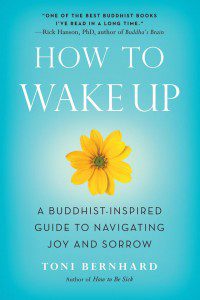 We have been asleep, collectively and individually and there is a growing call to wake up. The Buddha was the first to suggest this change in consciousness 2500 years ago (and as you know the term buddha means one who has awakened). And now there are three books that have come to my attention with waking up in the title.
We have been asleep, collectively and individually and there is a growing call to wake up. The Buddha was the first to suggest this change in consciousness 2500 years ago (and as you know the term buddha means one who has awakened). And now there are three books that have come to my attention with waking up in the title.
These are How to Wake Up: A Buddhist-Inspired Guide to Navigating Joy and Sorrow by Toni Bernhard, Three Steps to Awakening: A Guide for Bringing Mindfulness to Life by Larry Rosenberg and Laura Zimmerman, and Waking Up: A Guide to Spirituality Without Religion by Sam Harris.
Today I will review Toni Bernhard’s How to Wake Up. I am looking forward to reading Larry Rosenberg’s latest book. Larry’s books are always lucid, forthright, and beneficial as are his teachings on retreat. I am also looking forward to Sam Harris’s book as I imagine it may inspire my own efforts to write a spiritual memoir.
This is Toni Bernhard’s second book. Her first (also published by Wisdom) was How to Be Sick: A Buddhist-Inspired Guide for the Chronically Ill and Their Caregivers. I recommended this book to a patient who had just been diagnosed with a serious illness. She at first bristled that she did not want to hear about Toni’s story about becoming ill. However, she opened herself to that story and the wisdom that followed. The result was nothing short of profound. This book helped my patient to cope with a very difficult treatment process and she expressed a deep sense of gratitude for what Toni had shared with her book.
How to Wake Up is a wonderful book about the Buddha’s teachings. There are seemingly now countless books on mindfulness and Buddhism and they all pretty much cover the same basic set of teachings in their own way. The key is not finding a book that speaks the truth but a book that speaks the truth to you. Does the author’s voice reach inside you to touch the places that recognize the truth of these teachings. It’s not rocket science and it’s not even intellectual. The truth of the Buddha’s teaching can be observed and felt in this very moment when you are paying sufficient attention.
Reading How To Wake Up, I feel like I am swimming in a comfortably cool stream that is moving with a firm yet not overwhelming current. I am being carried downstream towards what feels like home.
It’s rare that I learn anything radically new in reading mindfulness and Buddhism books since I’ve read so many of them over the past thirty years and I’ve written a few of my own. I often glaze over when reading many because the content is just so familiar and it is presented in a pedestrian way. However, there are times, like when reading How to Wake Up, that things come into focus in a pleasing way. Her descriptions are lucid, incisive, and accessible. She makes the teachings available and while I’m not learning anything new, I am experiening the material at a deeper level. It is a pleasant re-acquaintance with topics such as impermanence, dissatisfaction, and desire.
After my own heart, she quotes Don Draper (I am an avowed Mad Men junkie) when speaking of the impermanence of satisfaction and how things and situations cannot provide lasting happiness. Don asks “What is happiness?” And then provides the answer: “It’s a moment before you need more happiness.” How to Wake Up shows us how to avoid this trap of incessant happiness seeking. There is an alternative. Bernhard says, “There is a profound happiness is that is not dependent on getting what we want or not getting what we don’t want. It’s the contented happiness of awakening, a happiness that arises when we are able to live each moment fully as it is without needing it to be different.”
Reading a book won’t make you awakened. No book can do that. However, a good dharma book can open the door and How to Wake Up is a wonderful dharma book that will make these simple and profound truths feel like common sense. She offers practical guidance as well, including guided meditations.
There are many books to read on mindfulness and Buddhism. How to Wake Up is one of the better ones. It is written from a direct connection to the Buddha’s teaching and avoids intellectualism while remaining elegant. It is well written and a pleasure to read. For the uninitiated t is a complete primer on the topics of mindfulness and the Buddha’s primary teachings of impermanence and its consequences for desire and self. For the initiated, it will be refreshing read to bring the teachings back into focus, breathing life into concepts that may have grown recondite, abstract, and stale. After reading How To Wake Up, you’ll be a little more awake in your life and we could all benefit from that.

